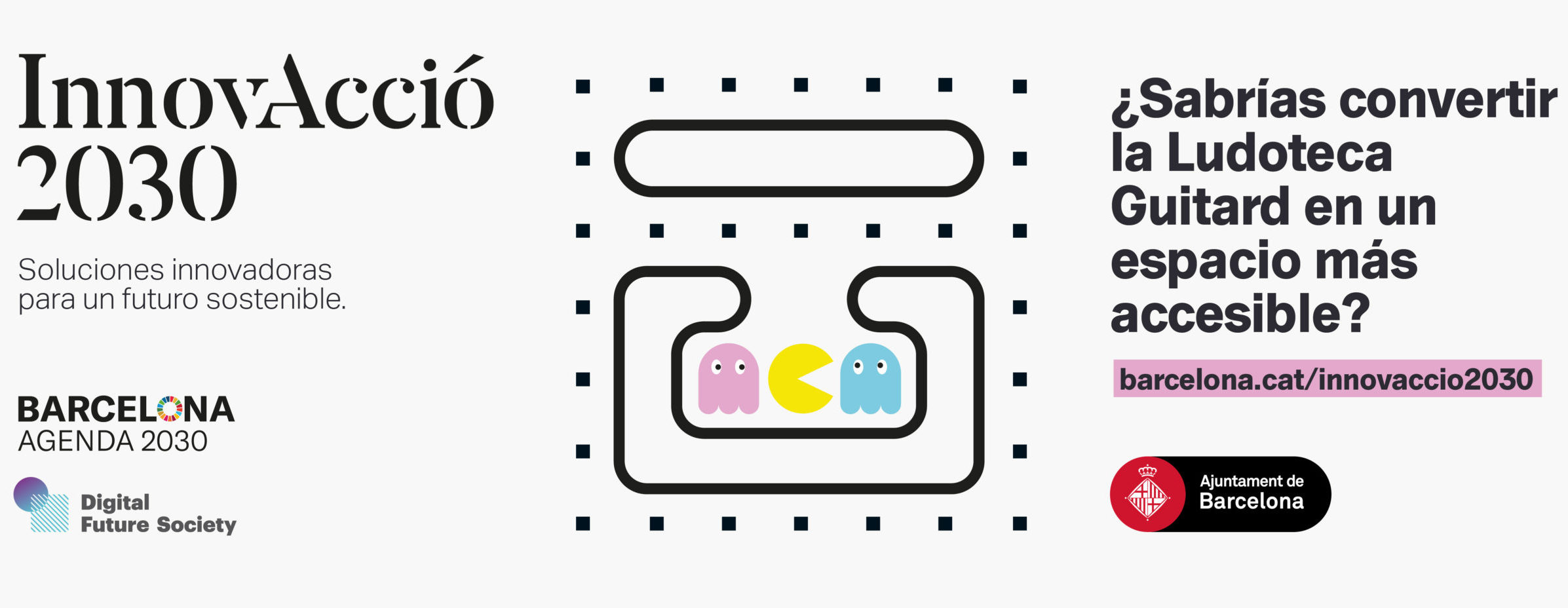
- The initiative is part of InnovAcció 2030, a programme promoted by the 2030 Agenda Commissioner, which will pose two more challenges in Eixample and Horta-Guinardó during the first quarter of 2022
- The aim of the challenge in les Corts seeks to advance universal accessibility of public facilities and, specifically, improve the cognitive and communicative accessibility of the district’s playroom Guitard
- The winning proposal will be announced in May and will receive a financial contribution of up to 40,000 euros financed by les Corts and the Municipal Institute for People with Disabilities.

8 February, 2022
Barcelona, February 8, 2022.- Digital Future Society and the City Council of Barcelona, via the 2030 Agenda Commissioner, the district of les Corts and the Municipal Institute for People with Disabilities (IMPD), have launched the first of three challenges that will be carried out at a district scale in the city to seek for innovative digital solutions, focused, in this case, on cognitive accessibility.
The initiative is part of InnovAcció 2030, a programme led by the 2030 Agenda Commissioner, which aims to identify and test a series of technological solutions that generate a positive impact on citizens and simultaneously contributes to achieve the Sustainable Development Goals (SDG) in the city of Barcelona. This collaboration between Digital Future Society and the City Council in les Corts will continue throughout this first quarter of 2022 with the launch of new calls for districts like Eixample and Horta-Guinardó. The three challenges have already been identified at a city scale.
The proposed challenge seeks to improve accessibility and inclusion in the Guitard playroom, a local facility in the district of les Corts, inaugurated in 2010, and part of the city’s network of public children’s services.
The call seeks to identify technological solutions capable of making spaces more flexible, adapting tools and games, thus improving cognitive and communicative accessibility, in such a way that boys and girls with any type of disability (physical, intellectual, visual and/or auditory, for mental health disorders) as well as their relatives, can enjoy playing together and consequently share a leisure and relationship space with other users. In this sense, they aim to take steps forward to make the right to universal accessibility effective and promote equal opportunities for participation and inclusion of people with disabilities in all aspects of social, cultural, and educational life.
This action responds to the desire to make municipal facilities more accessible, proposed, among others, through the Inclusion Space of les Corts, a space for action, reflection and interaction that brings together entities of people with disabilities, entities of economic sectors and knowledge agents, who work with the aim of guaranteeing equal opportunities in all areas and expanding integration actions.
The third deputy mayor, Laia Bonet, stressed that “this challenge is an example of how to use technology at the service of citizens and as a tool for social inclusion. Technology should not become a barrier but rather a lever to build cities that are more accessible and better connected to each of the citizens who live there”.
Cristina Colom, director of Digital Future Society, highlights the importance of these calls since “they bring us closer to finding technological proposals that have a positive impact for citizens through those who have the answers and the spirit to help: companies and innovators”.
According to the councillor of les Corts and of Children, Youth, Seniors and People with Disabilities and president of the IMPD, Joan Ramon Riera, “we must think of the city in plural, incorporating all perspectives and fully integrating diversity. Creating an inclusive games library is an important challenge to ensure the right to play for all children, all of them, including those with disabilities”.
The call is open until March 30th and is aimed at entities, companies, organizations or entrepreneurs with a vocation and ability to generate innovation and guarantee an inclusive view, to not leave anyone behind in this technological revolution. The winning proposal will be chosen through an evaluation process consisting of three phases. The last phase includes a committee of external evaluators who will choose the most innovative solution. This will be announced at the beginning of May and will receive financial support of up to 40,000 euros with a joint funding with the district of les Corts and the IMPD.
The 2030 Agenda Commissioner and Digital Future Society are working with the management of three districts of Barcelona – les Corts, Eixample and Horta-Guinardó- to define these three innovation challenges in the territory. In this case, the 3 organizations have defined the different innovative challenges for each district based on problems of universal accessibility, derived from tourism and urban mobility. From this initial decision Digital Future Society is responsible for the search, selection, and implementation of the winning projects, evaluating the impact of the technologies proposed in response to the challenges.
These three challenges at a district scale add to those promoted jointly with B:SM to achieve a more inclusive visit to Park Güell and the Barcelona Zoo and to ensure proper use of public parking spaces for reserved publics.
For further information visit the web:
https://digitalfuturesociety.com/innovaccio2030-repte-ludoteca-guitard/
https://ajuntament.barcelona.cat/agenda2030/es/proyectos/innovaccio-2030
Stay up to date about everything
Subscribe to stay up to date with the latest content from Mobile World Capital Barcelona.